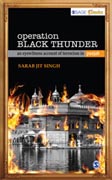
Terrorism has affected several of India’s states, at different times and in different forms, and continues to be a matter of national, and increasingly international, concern. One of the states most affected by terrorism was Punjab, which was torn apart by acts of violence during the 1980s, while its people were caught in the crossfire between the threats of the terrorists and the Indian government’s attempts to combat them. The Golden Temple in Amritsar was the scene of two pivotal anti-terrorist operations during this decade- Operation Blue Star in 1984 followed by Operation Black Thunder in 1988, when the Indian government dislodged terrorists who had occupied this holiest of Sikh places of worship. The consequences of Operation Blue Star included the assassination of Indira Gandhi-the Prime Minister who sanctioned the operation. The success of Operation Black Thunder, on the other hand, was a turning point in the battle against terrorism. Centred around a gripping account of Operation Black Thunder, by one who initiated it and was intimately involved in executing it, this absorbing book analyses the factors responsible for the rise and growth of terrorism in Punjab, including the role of Pakistan in promoting terrorism in India. Pulling no punches, the author also criticizes the role of politicians and the Congress government in Delhi, particularly its use of central intelligence agencies in order to undermine the growth of a regional party like the Aklali Dal by promoting the rise of leaders such as Jarnail Singh Bhindranwale. Sarab Jit Singh covers the history of Punjab during the 1980s from before the Rajiv-Longowal Accord, through the tenure of successive Governors and their measures to curb terrorism, till elections were held in the early 1990s and peace was finally restored to Punjab. In the process he brings to light many crucial and significant events which have remained shrouded in mystery. Combining an impartial and authentic eyewitness account of a tumultuous period in contemporary political history with a critical analyses of the causes of the growth of terrorism in Punjab and the methods used to combat it, this book will be of interest to students of politics, public administration, contemporary Indian history and the general reader. INDICE: ForewordPrefaceThe Golden Temple: In the Eye of the StormThe Sikh Heritage and the Punjab ProblemThe Rajiv-Longowal Accord: The 'Secret' Healing TouchS S Barnala's Government: The Healing Touch ImpairedGovernor Ray's TenureThe Politics of the ClergyJanuary—March 1988: The Killings IncreaseApril—May 1988: Measures to End the KillingOperation Black ThunderThe Militants SurrenderTrial at MidnightRestoring the MaryadaDemoralisation Versus a Gun BattleThe SGPC's DilemmaJasbir Singh Rode's DismissalThe Corridor PlanJasbir Singh Rode ResurrectedPanchayat Elections Postponed: Missed OpportunitiesThe Militants and the Police: Between the Two TerrorsThe 'National Games'A New Government at the CentreThe `Civil Face' of Governor Mukherjee's AdministrationGovernor Varma's Tenure1990: The Killings ContinueGovernor Malhotra Takes ChargeAttempts to Restore DemocracyDelhi's Inconsistent Punjab PolicyElections by February 1992From President's Rule to an Elected Government: The Return of DemocracyIn Retrospect
- ISBN: 978-8-1321-1794-0
- Editorial: SAGE Publications Pvt. Ltd
- Encuadernacion: Rústica
- Páginas: 364
- Fecha Publicación: 08/04/2014
- Nº Volúmenes: 1
- Idioma:
